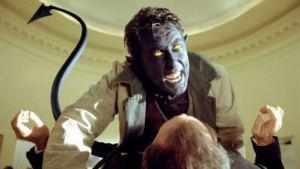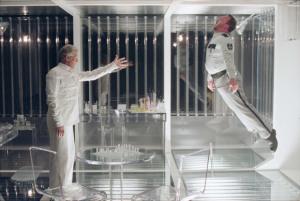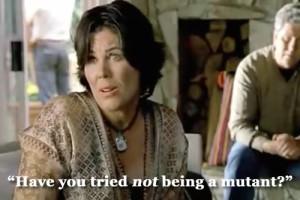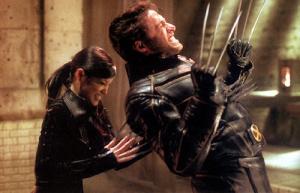In this post I finally get around to reacting to Warner Bros.’ peculiar approach to its forthcoming Aquaman movie, and look to the X-Men franchise for guidance. Wait, why the X-Men franchise? Because they’ve done this kind of thing a couple of times already.
Aquaman

It’s still not technically confirmed that Jason Momoa is playing Aquaman…but we all assume he is
A little over a week ago, The Hollywood Reporter exclusively revealed that Warner Bros. is employing a parallel script development strategy for Aquaman whereby two different writers (Gangster Squad’s Will Beall, 300’s Kurt Johnstad) have been hired to create separate scripts which will most likely end up being combined into one presumably super-script. While this may sound like a strange way to do things, it’s actually one of Hollywood’s hottest trends:
Executives and agents say double hirings are on the rise partly because of the demands of the tentpole era. Dates for movies often are set while projects still are in development, creating urgency to move fast. And with reboots and reimaginings, studios sometimes ask for multiple takes before jigsawing the scripts together.
In addition to Aquaman, parallel script development has recently been used for projects like a new Tarzan movie (tentatively starring Alexander Skarsgard), a Mummy reboot at Universal, and a new Scooby-Doo film, except there the competition is between a script for a live-action feature and a script for a completely animated film.
The fact that Warner Bros. is utilizing this approach with Aquaman has mostly inspired head-scratching followed by empathy for the awkward positions Beall and Johnstad have been placed in followed by your standard-grade “Warner Bros. has no idea what they’re doing with their DC movies!” arguments.
On the empathy side of things, Hitflix’s Drew McWeeny called on the Writers Guild of America to stop studios from doing this kind of thing in the future, arguing:
“By commencing both Beall and Johnstad on scripts, the studio is telling them right up front that someone’s going to win this process and someone’s going to lose. That’s not the way a creative endeavor should work. You can’t do great work if you’re stressed that you’re going to lose the job or worse, that you’re going to turn something in that’s simply going to disappear into the process.”
On the screw Warner Bros. side, FilmSchoolRejects’ Scott Beggs argued “this development is another sign that Warners is more beholden to a list of release dates for Untitleds than to a true, overarching blueprint for how their cinematic superworlds will cohere. “
This does sound like a tall glass of suck for the writers, and Warner Bros. is still ever so far behind Marvel in terms of long-term planning and all that. However, I don’t have nearly as invested an interested in this as others because unlike McWeeny I am not a WGA member, and as stated elsewhere on the site I am not an Aquaman fan (nor am I really an Aquaman hater). This is far from the first time Warner Bros. will have multiple scripts in development at the same time for the same character(s) lest we forget about the development process between Batman & Robin and Batman Begins/Superman Returns.
How Does Parallel Development Work from a Practical Standpoint?
In the case of Tarzan, Adam Cozad and Craig Brewer each penned separate scripts which were fuzed together when the studio preferred Cozad’s action and structure elements and Brewer’s characterization. That was perhaps a best-case scenario. For Universal’s Mummy re-boot, Jon Spaihts and Billy Ray working concurrently on their separate script before the studio focused on Spaihts’ draft meaning though Ray was obviously paid for his work he’s probably not even going to get at least a story credit out of the whole affair.
How Has the X-Men Film Franchise Used This Strategy?
Parallel script development is mostly being regarded as a relatively new concept which is far more common than we realize. However, I am immediately reminded of how Fox actually owes its scripts for X2 (2003) and X-Men: The Last Stand (2006) to parallel development:
X2 –
Writer/actor David Hayter began work on the first X-Men as an administrative worker, answering phones in the production offices, a job he only got because of his friendship with Bryan Singer. However, since Hayter was a huge fan of the X-Men comics Singer often used him as a soundboard to help work through the issues they were having with the script. Eventually, Hayter become so invaluably to Singer that he was just hired to completely re-write the script, earning the WGA minimum salary and sole credit for the screenplay in the process.
After the film made enough money to earn a sequel, Hayter was eager to return, but he wanted a bump in salary. As those negotiations dragged on, Fox turned to one of its contract writers, Zack Penn (Last Action Hero), to produce a draft for X2. By the time Hayter was finally back on-board, he had been told another writer had been hired to write a script simultaneous to his own. Interestingly, Penn was not told the same thing. He was actually led to believe that he was the one writing X2 whereas Hayter was going to write X2’s sequel, or vice versa.
If that was the case, the problem was that both Penn and Hayter wanted to use the X-Men graphic novel “God Loves, Man Kills” as the basis for their script. Fox was cool with that, and let them each take their crack at it, ultimately using most of Hayter’s script for the story but a little bit of Penn’s as well:

Nightcrawler’s amazing opening scene in the White House is straight out of Hayter’s script

Magneto’s astounding prison breakout was originally introduced in Penn’s script
The funny thing is that what ultimately ended up happening to both Hayter and Penn is that they got re-written. Hayter left the film during pre-production to work on a TV show he had created, and Singer brought in Dan Harris and Mike Dougherty to do a simple script polish. Instead, they re-wrote so much of it that they ended up receiving a screenplay credit alongside Hayter (Penn received a story credit), and have now pretty much made their entire careers off the notoriety of being the guys who wrote X2. Such classics moments from the film which are solely attributable to Harris and Dougherty include:

Originally, Iceman’s parents were fully aware he was a mutant; Harris/Dougherty turned it into a “coming out” scene

Originally, Stryker’s assistant was Anne Reynolds; Harris/Dougherty turned her into Lady Deathstrike and created this kick-ass fight scene

Originally, Jean Grey was to go full-on Phoenix and commit suicide by film’s end; Harris and Dougherty pushed that to the sequel
X-Men: The Last Stand –
Bryan Singer, Mike Dougherty, and Dan Harris all had some clear ideas about what they were going to do with a X-Men 3, but after months of contract negotiations Singer unceremoniously cut-off talks with the studio and shortly thereafter announced he was jumping to rival studio Warner Bros. to make Superman Returns. Not only that, he was taking Dougherty and Harris with him.
Fox. Was. Pissed. The logical thing to do at that point would have been to delay X-Men 3, which they had already announced for May 2006, but they were having none of that. They were instead even more motivated to get the film done on time just to stick it to Singer and company, whose Superman film was now due to come out the same summer as X-Men 3. So, by March 2005 Fox had hired Matthew Vaughn to replace Singer as director, and commissioned competing scripts from Zak Penn and Simon Kinberg (Mr. & Mrs. Smith), with pre-production set to kick off 4 months later and filming 3 months after that.
Penn had gone through this dance on X2, and he wasn’t about to do it again:
Simon and I got together and said let’s not do this, let’s sit together and talk about what we think the movie should be –which by the way was very different from what the studio wanted to do – and we kind of went in as a united front. It actually helped us tremendously in terms of saying to the studio, “You know what? Maybe you guys should take a step back and let people who really love this franchise and really want to work on it full-time have some say in what’s going to happen with it.”
With this united front, Penn and Kinberg convinced the studio that the movie needed to be about the Dark Phoenix, but they had to concede it couldn’t be the only plot, thus resulting in the addition of a “mutant cure” storyline adapted from Joss Whedon’s then-very-recent “Gifted” story arc from Astonishing X-Men.
Gosh, that all sounds great. Solidarity, writers! It’s just too bad that their Last Stand script ended up being so terrible, so bad that Simon Kinberg has since written an X-Men movie (Days of Future Past) that goes out of its way to complete erase the events of Last Stand from history. It wasn’t all on them, of course, considering that Matthew Vaughn quit during pre-production leaving Brett Ratner to come in and mostly do his best to simply get the movie done on time.
So, there you have it – two examples of prior parallel script development in the comic book movie genre. One of them (X2) worked, but mostly because two different guys came in near the end and totally put their unique stamp on things, performing re-writes on the set and only coming up with the film’s ending halfway through production. The other (The Last Stand) crashed and burned, despite the efforts of the writers to work around the whole “parallel script” thing. What Warner Bros. probably needs is for their competing Aquaman scripts to provide a basic story which a James Gunn writer-director type can come in and polish into something awesome.
Oddly enough, Warner Bros. actually already has a finished Aquaman script. It’s from Heath Corson, and it’s going to hit small-screens as the direct-to-video animated film Justice League: Throne of Atlantis in 2015. It even includes a scene where a drunken Aquaman talks to lobsters through the glass of an aquarium at a seafeed restaurant. It’s pretty legitimately funny:
What do you think? Is Parallel Script Development truly the scourge of our times? Does this all not really seem that out of the ordinary for how Hollywood develops its scripts? Is this just maybe a power struggle going on at Warner Bros. where one person favored one approach and another was gung-ho for something different thus the two scripts? Or does none of this matter because Aquaman will simply never make for a good movie? Let us know in the comments.
Source: Mutant Cinema: The X-Men Trilogy From Comics to Screen

